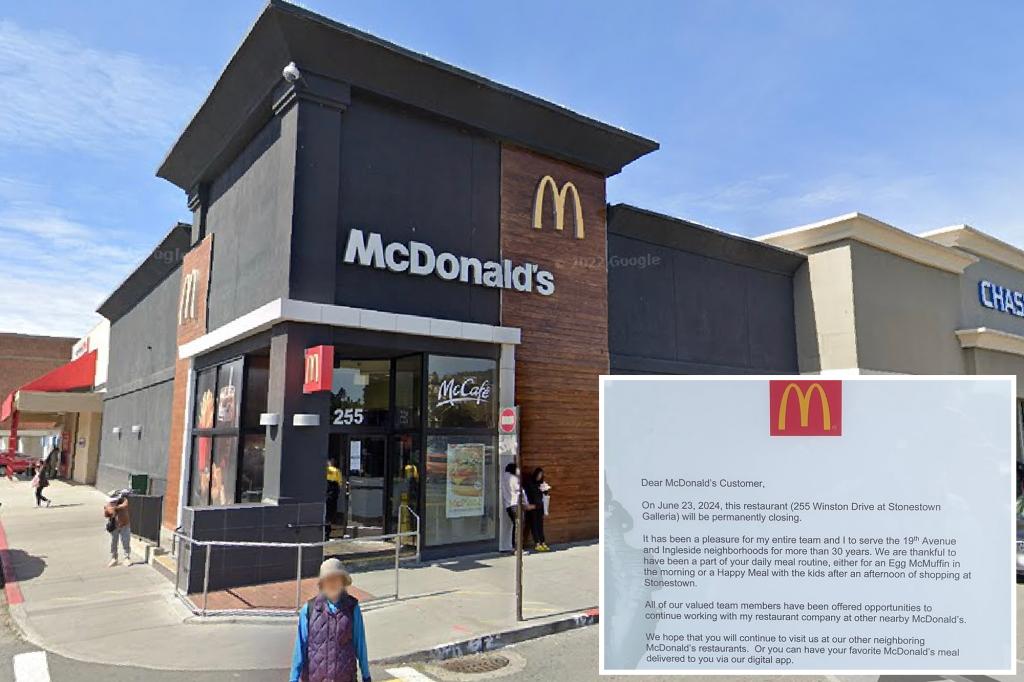A longtime McDonald’s in San Francisco has closed its doors due to California’s new $20 minimum wage law. The McDonald’s at Stonestown Galleria shopping mall, after more than 30 years of service, shut down because the increased minimum wage made it too expensive to operate. The franchise owner, Scott Rodrick, cited the wage hike, high property taxes, and the refusal of the landlord to negotiate on rent as factors contributing to the closure. He expressed sadness over the closure and offered opportunities for his team members to continue working at other McDonald’s locations.
The closure of the McDonald’s is part of a trend of businesses shutting down in California due to the new minimum wage requirements. A 55-year-old Arby’s Roast Beef in Hollywood closed earlier in June, citing the $20 minimum wage as a significant factor in its closure. Rubio’s Coastal Grill closed numerous locations across the state and filed for Chapter 11 bankruptcy shortly after. Other fast food chains like Fosters Freeze have also been forced to close locations and have directly attributed the minimum wage increase to their demise. In response, some chains have raised their prices by up to 8% to cover the increased labor costs.
The impact of the $20 minimum wage law in California has led to a decrease in customer visits to fast food chains like McDonald’s, Wendy’s, Burger King, Starbucks, and Chipotle. Analytics firm Placer.ai reported a decline in customer visits following the price increases by these chains. The closures and price raises demonstrate the challenges that businesses are facing in adapting to the new minimum wage requirements in California. Some businesses are struggling to stay afloat, while others are passing on the increased costs to consumers.
Despite the closures and challenges faced by businesses, the franchise owner of the McDonald’s at Stonestown Galleria expressed gratitude for the opportunity to serve the neighborhood for over 30 years. He emphasized that all team members were offered opportunities to continue working at other McDonald’s locations. The closure of the McDonald’s highlights the difficulties faced by businesses in navigating the changing economic landscape in California. The impact of the $20 minimum wage has been significant, leading to closures, price increases, and decreased customer visits at fast food chains across the state.
The closure of the Stonestown Galleria McDonald’s serves as a reminder of the difficulties faced by businesses in adapting to new economic policies. The franchise owner’s decision to close the location due to the increased minimum wage reflects the challenges that many businesses are facing in California. As businesses struggle to cope with rising costs, closures, price increases, and bankruptcy filings have become more common. The closure of the McDonald’s is just one example of how businesses are being impacted by the changing economic landscape in California.
The ongoing impact of California’s $20 minimum wage law on businesses, particularly in the fast food industry, highlights the complex relationship between labor costs, consumer prices, and business sustainability. As businesses grapple with the challenges of increased minimum wages, some are forced to make difficult decisions that can have far-reaching consequences. The closure of the McDonald’s at Stonestown Galleria is a poignant example of the real-world effects of policy changes on businesses and employees. Moving forward, businesses in California will continue to face challenges in navigating the evolving economic landscape and finding ways to adapt to changing labor and cost structures.












